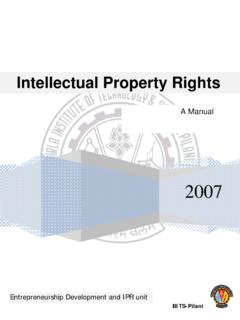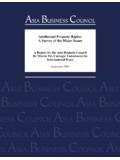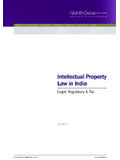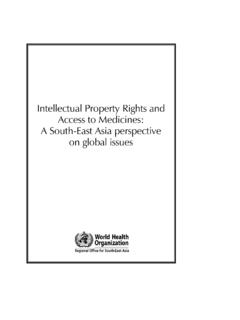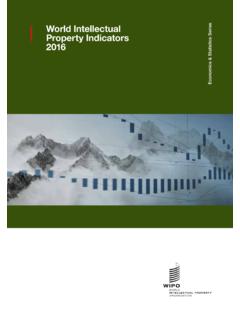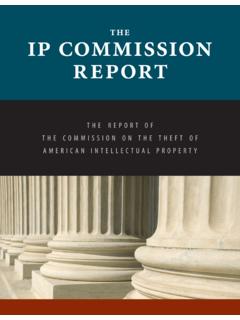Transcription of Intellectual Property Rights - Birla Institute of ...
1 Intellectual Property Rights 2007 BITS-PilaniEntrepreneurship Development and IPR unitA Manual A MANUAL ON Intellectual Property Rights (IPR) Entrepreneurship Development and IPR Unit Birla Institute OF TECHNOLOGY & SCIENCE, Pilani November 2007 Preface This manual provides guidelines relating to the procedure of filing patents applications in India. The manual takes care of amendments that have been brought out in the Patents Act from time to time including new provisions of the law viz. The Patents Act, 1970 as amended by the Patents (Amendment) Act of 1999, the Patents Amendment Act 2002, and further, by the Patents (Amendment) Ordinance 2004 Act 2005. The main purpose is to create awareness amongst the faculty members and researchers about patents system in India and to provide user friendly guidelines for obtaining and maintaining patents under the existing Patents law.
2 It is expected that this manual will be of significant help to people involved in innovation and invention activities towards protecting their Intellectual Property Rights arising as an outcome of their efforts. This is only a preliminary step towards creating awareness about Intellectual Property Rights (IPR). Suggestions for improving the quality of the manual are welcome. Entrepreneurship Development & IPR Unit, BITS, Pilani 333 031 (Rajasthan) List of Contents CONTENTS Intellectual Property Rights ..1 Introduction .. 1 Legislations Covering IPRS in INDIA .. 3 PATENTS ..3 Conditions to be satisfied by An Invention to be 6 Patentable Inventions under the Patents Act, 1970 .. 7 Types of Inventions which are not Patentable in 7 Term of a Patent in the Indian System.
3 9 Essential Patent Documents to be submitted .. 9 Criteria for Naming Inventors in an Application for Patent .. 10 Where to apply? .. 11 How to apply ? .. 12 Why Provisional Specification ?.. 13 Complete Specification .. 14 Hierarchy of Officers in Patents Office .. 17 Register of Patents .. 17 Working of Patents and compulsory Licensing .. 19 Revocation of Patents .. 22 Term of 24 Patent of Addition .. 24 COPYRIGHT ..25 Entitlement to Copyright .. 25 Works Protected by Copyright .. 26 Rights granted by Copyright .. 26 Copyright Ownership - Who owns what in a Copyright Work? .. 27 Copyright 27 Copyright Ownership in Computer Generated 27 Copyright Ownership in an Employer-Employee Relationship .. 27 Ownership of Copyright by Staff .. 28 Copyright Ownership in Collaborative 28 Copyright Ownership by Students .. 29 Duration of Copyright Protection.
4 29 Infringement of Copyright .. 30 Library Uses .. 30 How to file a Copyright Application? .. 30 TRADE MARKS ..31 GEOGRAPHICAL INDICATIONS ..31 Documents required for filing Geographical Indications .. 32 Additional Requirements .. 32 INDUSTRIAL DESIGNS ..33 Documents 33 Steps involved in Registration of Designs .. 33 LAYOUT DESIGN OF INTEGRATED CIRCUIT ..34 PLANT VARIETY ..34 Plant Breeder .. 35 New Plant Varieties and TRIPS Agreement .. 35 INTERNATIONAL Need for International 36 Patent Cooperation Treaty ("PCT") (1970) .. 36 General Information Concerning US Patents .. 37 Appendix-1 : The Patenting 43 Appendix-2: Stages of Prosecution of IPR Application in Appendix-3: Fee Payable for Patent Application in ..45 Appendix-4 : Important List of Forms for IPR ..50 Appendix- 5: Some Examples of patents ..51 ANNEXURES ..55 Annexure-1: Details of Forms for filing of Patent Application.
5 55 Annexure-2: List of Forms for filing Industrial Designs .. 66 Annexure-3: Intellectual Property Rights : Instruments, Subject Matter, fields of Application and Related WIPO and Other International 68 Annexure-4: List of Web Sites for more details on IPR .. 70 Annexure-5: List of Web Sites to find out details of Patents .. 70 Annexure-6: Some Important Definitions Related to 1 Intellectual Property Rights Introduction For nearly last two hundred years, neo-classical economics had recognized only two factors of production: labour and capital. But now this is changing. Information and knowledge are replacing capital and energy as the primary wealth-creating assets, just as the latter two replaced land and labour 200 years ago. In addition, technological developments in the 20th century have transformed the majority of wealth-creating work from physically-based to "knowledge-based.
6 Technology and knowledge are now the key factors of production. With increased mobility of information and the global work force, knowledge and expertise can be transported instantantly around the world, and any advantage gained by one company can be eliminated by competitive improvements overnight. The only comparative advantage a company will enjoy will be its process of innovation--combining market and technology know-how with the creative talents of knowledge workers to solve a constant stream of competitive problems--and its ability to derive value from information. The major challenge before organizations in the coming years would be to create a culture for IPRs regime, so that creative work and innovations get duly protected. More and more organizations may have to provide at their cost the services of IP Management Consulting Firm for drafting/prosecution of the Intellectual Property (IP) application(s) and also provide adequate funds for making payments for accessing the relevant IP databases for this purpose.
7 Thus, to make Economics of Knowledge as the greatest strength of Indian economy, there would be need for creating an ecosystem for promotion of particularly knowledge driven entrepreneurship with major emphasis on creating an environment and a system to provide due protection to the Intellectual properties. This can be achieved by creating a stringent IPR regime. 2 Intellectual Property Rights (IPR), very broadly, are Rights granted to creators and owners of works that are results of human Intellectual creativity. These works can be in the industrial, scientific, literary and artistic domains, which can be in the form of an invention, a manuscript, a suite of software, or a business name. The importance of Intellectual Property in India is well established at all levels- statutory, administrative and judicial. India ratified the agreement establishing the World Trade Organisation (WTO).
8 This Agreement, inter-alia, contains an Agreement on Trade Related Aspects of Intellectual Property Rights (TRIPS) which came into force from 1st January 1995. It lays down minimum standards for protection and enforcement of Intellectual Property Rights in member countries which are required to promote effective and adequate protection of Intellectual Property Rights with a view to reducing distortions of and impediments to international trade. The obligations under the TRIPS Agreement relate to provision of minimum standard of protection within the member countries legal systems and practices. The Agreement provides for norms and standards in respect of following areas of Intellectual Property : Patents Copyrights and related Rights Trade Marks Geographical Indications Industrial Designs Layout Designs of Integrated Circuits Protection of Undisclosed Information (Trade Secrets) Plant varieties IPR is a general term covering patents, copyright, trademark, industrial designs, geographical indications, protection of layout design of integrated circuits and protection of undisclosed information (trade secrets).
9 3 Legislations Covering IPRS in INDIA Patents: The Patents Act, 1970. The act was last amended in March 1999. Design: The Designs Act, 1911. A new Designs Act 2000 has been enacted superseding the earlier Designs Act 1911. Trade Mark: The Trade and Merchandise Marks Act, 1958. A new Trademarks Act, 1999 has been enacted superseding the earlier Trade and Merchandise Marks Act, 1958. (Enforcement pending) Copyright: The Copyright Act, 1957 as amended in 1983, 1984 and 1992, 1994, 1999 and the Copyright Rules, 1958. Layout Design of Integrated Circuits: The Semiconductor Integrated Circuit Layout Design Act 2000. (Enforcement pending) Protection of Undisclosed Information: No exclusive legislation exists but the matter would be generally covered under the Contract Act, 1872 Geographical Indications: The Geographical Indication of Goods (Registration and Protection) Act 1999.
10 (Enforcement pending). PATENTS The Patents Act, 1970 is a landmark in the industrial development of India. The basic philosophy of the Act is that patents are granted to encourage inventions and to ensure that these inventions are worked on a commercial scale without undue delay. 4 The word Invention has been defined under the Patents Act 1970 as amended from time to time; as An invention means a new product or process involving an inventive step and capable of industrial application (S. 2(1) (j)) New invention is defined as any invention or technology which has not been anticipated by publication in any document or used in the country or elsewhere in the world before the date of filing of patent application with complete specification, the subject matter has not fallen in public domain or that it does not form part of the state of the art.
